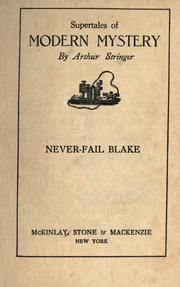WE ARE FILLING our heads with a lot of sentimental nonsense when we take it without question that the criminal of stage and fiction and the criminal of real life are one and the same.
Mr. Arthur Stringer, who knows something about both types, having dealt with them in real life for the sake of his fiction, declares they are about as wide apart as the poles. He finds it high time for some one to point out this fact and to stop the stultification of one's intelligence with such beliefs.
The ''crime writers,'' he reminds us, have been "solemnly announcing themselves as realists." Even editors are beginning to affix foot-notes to say that their crime stories are transcripts of real life.
A crime novel asserts that it is an actual portrayal of police conditions. A playwright gets an ex-convict to form a member of the cast. Some of the ways in which these so-called realists fool the gullible among us are set forth by Mr. Stringer . . . — Unsigned, "The Lure of the Criminal," THE LITERARY DIGEST (April 26, 1913)Stringer presents a veritable catalogue of avoidable errors that crime fiction authors can stray into:
"I know of one novelist who describes a safe-breaking scene wherein the master-crook attaches a wire to a chandelier and an electrode to the end of this wire, and by the deliciously naive means of a mere lighting circuit burns his way through a ponderous steel door. It would be no more ridiculous to say that he pried that door off with his fountain pen.
"Another novelist with an international reputation has his villain sit on a steamer's deck and quietly read at the mast-head an incoming wireless message. It is of little consequence, of course, that the professional operator in the wireless room is compelled to have a microphone of the most delicate nature held close to his ear before he can even pick up that same incoming message. This same villain, I take it, could stand on the Singer Tower and hear a hairpin fall off a bureau up in Albany.
"An important feature in a reigning 'realistic' crook play is a Maxim silencer, which is used on a revolver, despite the fact that a silencer can not be and never has been attached to a revolver.
"In still another Broadway sleuth-play a woman under suspicion casually takes up a sheet of writing-paper from the desk of a man mysteriously murdered. The detective on the trail of the offender holds up this sheet to the audience, showing the finger-prints thereon imprest as plainly marked as ink spots. Now, the murdered gentleman may or may not have had the hobby of inditing his correspondence on chemically sensitized note-paper. Or, on the other hand, the lady under suspicion may have been opening a tin of printer's ink in one of the rooms off-stage. But without one of these two extremely remote contingencies the overconvenient appearance of those nice black blots must be accepted as either absurd or miraculous." — "The Lure of the Criminal," op. cit.As for how writers present their criminal characters:
"There is no such thing as a romantic criminal. By this I mean that there is no romance about professional crime. There is no Raffles in real life . . .
"The playwright who exploits crime loves to have his hero bad only nor'-nor'-east. When the wind is in the other quarter he is the gentlest of lovers and the most impeccable of characters.
"It is the same with the book criminal. Even his felonies areprompted by a supposedly ameliorating love of adventure. He follows the gentle art of burglary for the thrill that's in it. He likes the game for the game's sake. He makes house-breaking and highway robbery lose half their evil by losing all their grossness. He seduces you into the belief that it's quite fit and proper for him to take toll of the overjeweled ladies who are enjoying the same week-end with him in the same country house, or to exact midnight largesse from the altogether unsympathetic jeweler who has not appreciated his devil-may-care audacities, his good breeding, and his languidly enunciated epigrams.
"We remember that it's only human to sympathize with the bad and tolerate the good. We follow our fiction-made villain through his round of denatured adventures; we feel that he is being true to some wider scheme of things than the trivial laws that he is breaking; we like to witness his leap through the paper hoops of the temporal while swayed by those emotions which we regard as eternal." — "The Lure of the Criminal," op. cit.Resources:
- Wikipedia ("Arthur Stringer [writer]").
- Previous ONTOS article.
Category: Detective fiction


No comments:
Post a Comment